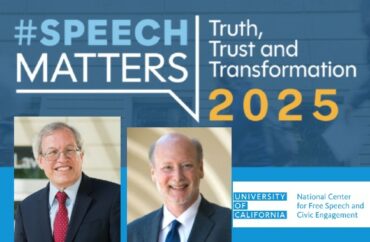
Scholars also raised concerns about recent immigration, free speech actions
Fears about the Trump administration’s actions connected to free speech, immigration, and research funding dominated scholars’ talks at the annual #SpeechMatters conference Thursday at the University of California.
“If there is a path towards authoritarianism in this country, this is where we are at. I have never been so afraid for the future of democracy as I am right now,” UC Berkeley School of Law Dean Erwin Chemerinsky said.
Chemerinsky, (pictured left) a co-chair of the UC National Center for Free Speech and Civic Engagement, which hosted the virtual conference, made the comment during a discussion about “recent challenges and opportunities for truth, trust and transformation on campus.”
He was joined by Howard Gillman, (pictured right) the chancellor at UC Irvine and fellow center co-chair. Together, they emphasized the impact of the Trump administration’s distrust of higher education.
There has been an “incredibly disruptive and even destructive effort to attack universities’ ability to do research,” Gillman said, noting the recent federal funding cuts to major research universities.
The conversation then pivoted to free speech on campus where both described their “horror” at federal immigration authorities’ detainment of Tufts University student Rumeysa Ozturk.
Her case has sparked free speech concerns. According to NBC 10 Boston, “her supporters say she was targeted for an op-ed she co-authored in support of Palestinians that was published in the university newspaper.”
Gillman described the complicated nature of stopping antisemitism while also protecting free speech under the current presidential administration.
“The balance between your obligations to provide a non-discriminatory learning environment but also protect free speech has been an issue throughout both Republican and Democrat administrations,” Gilman said.
“We have argued that you can’t hold a university accountable for violating discrimination laws just because people on the campus are exercising their free speech right. That has always been controversial but this administration has taken it to a new level,” Gilman said.
During another discussion, “(Re)Building Trust in Higher Education,” a group of panelists emphasized what they saw as destructive policies from the current presidential administration.
Saanvi Arora, a UC Berkeley student on the panel, said many students’ trust in higher education has diminished because of universities’ treatment of students at pro-Palestinian protests and encampments. She also brought up a lack of communication by faculty and administrators, policing on campus, and threats to intellectual freedom.
Panelists Steven Mintz, a professor of history at University of Texas at Austin and Bobbie Laur, president of the civic engagement coalition Campus Compact, addressed the issue from an administrative perspective.
Public education has gone from “a public good to a private good,” Mintz said. Faculty are all about doing their own research, students feel like consumers, and administrators act like CEOs, which is ruining the student experience, he said.
For Laur, one of reasons for the distrust is a “diplomat divide.”
“As we continue to have increasing wealth inequality, we start to see higher education isn’t perceived as something accessible for most,” Laur said. “This has caused the public social contract with higher education to be broken.”
In another panel, “Mis/Disinformation and the Decline of Expertise,” scholars agreed on the existence of the problem but disagreed about where it was most prevalent and how to combat it.
“Misinformation is not symmetrically spread across all political positions. There is very good evidence there is more misinformation on the conservative side than the liberal side,” Simone Chambers, chair of the political science department at UC Irvine, said.
“The problem is you have academic studies that identify the problem as being more prevalent in conservative communities and those studies are then accused of bias by conservatives,” Chambers said.
She also discussed why she believes the Trump administration is “attacking” universities and how it relates to the truth.
“Part of the attack on the universities right now is a kind of payback or punishment because the Trump administration knows that universities are generally not going to be a place that is favorable to them,” Chambers said. “Not just because generally speaking universities are center left as opposed to center right, but also because the priority is truth and knowledge.”
However, panelists Chris Coward from the University of Washington and Michael Wagner from University of Wisconsin-Madison saw misinformation as an “interdisciplinary” issue.
They shied away from Chambers’ framing of the issue as more of a conservative problem and instead emphasized universities need to understand it all types of misinformation, not just political. They also highlighted their colleges’ efforts to teach the public about misinformation through partnering with the media, hosting conferences, and more.
The final panel on “Campus Speech” focused on the environment on college campuses and the pro-Palestinian protests that began more than a year ago.
Miguel Ángel Hernández, the dean of students at San Francisco State University, brought an administrator’s perspective, discussing how he dealt with pro-Palestinian protests on his campus. He said he believed his university needed to emphasize that it did not “allow an encampment, but instead … responded to it and engaged with it.”
Through collaboration and engaging with students, Hernández said the protest became an important moment to grow as a community.
Panelist Kristen Shahverdian, the program director of campus free speech at PEN America, brought up the fear that she believes the current administration’s actions are causing on campus.
“The words fear and anxiety is pretty much what I’m hearing from people,” Shahverdian said. “The risks are so high for so many people.”
MORE: Faculty should use ‘collective power’ to resist Trump’s DEI directives: UMich webinar
IMAGE CAPTION AND CREDIT: A banner advertises the annual #SpeechMatters conference at the University of California. University of California National Center for Free Speech and Civic Engagement
Like The College Fix on Facebook / Follow us on Twitter

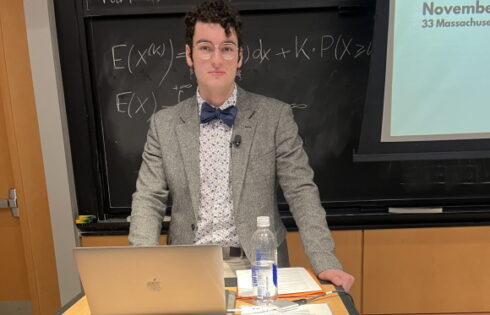
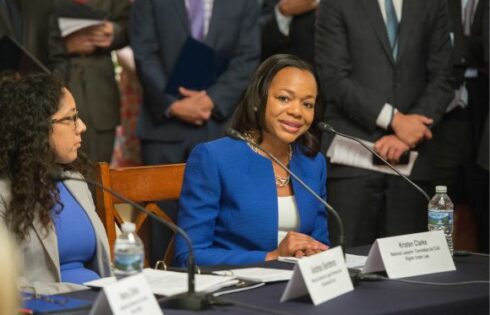
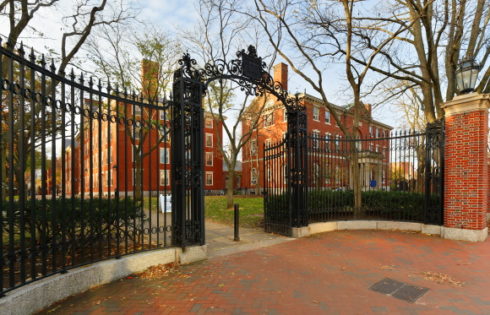
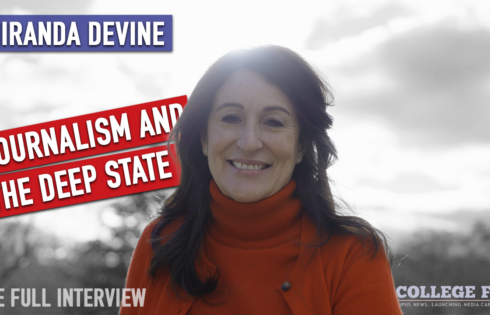
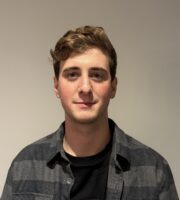
Please join the conversation about our stories on Facebook, Twitter, Instagram, Reddit, MeWe, Rumble, Gab, Minds and Gettr.